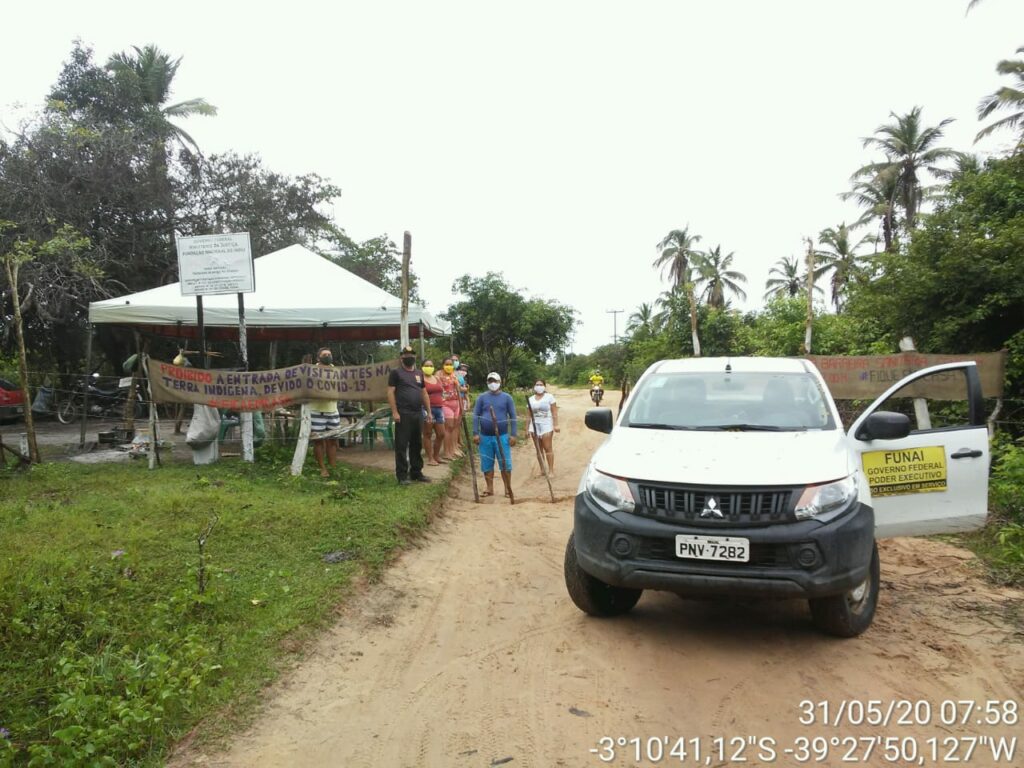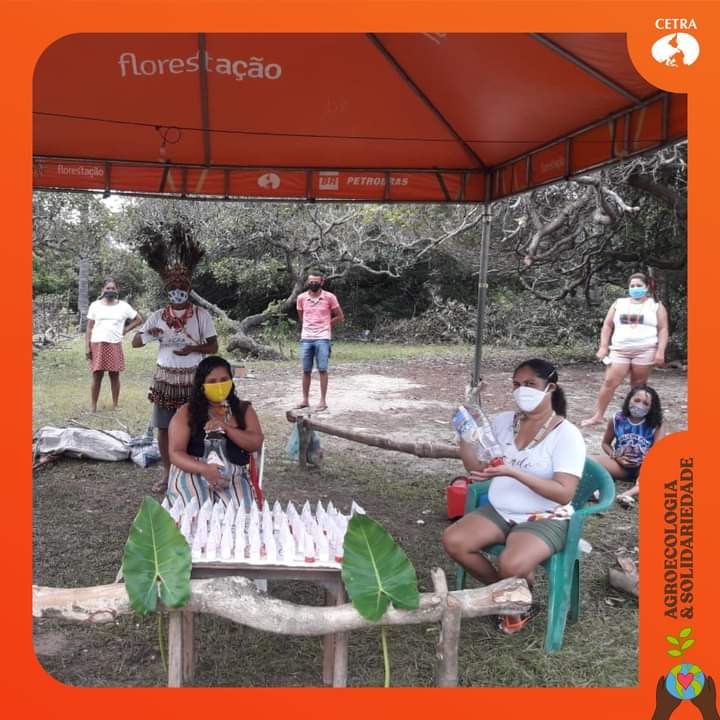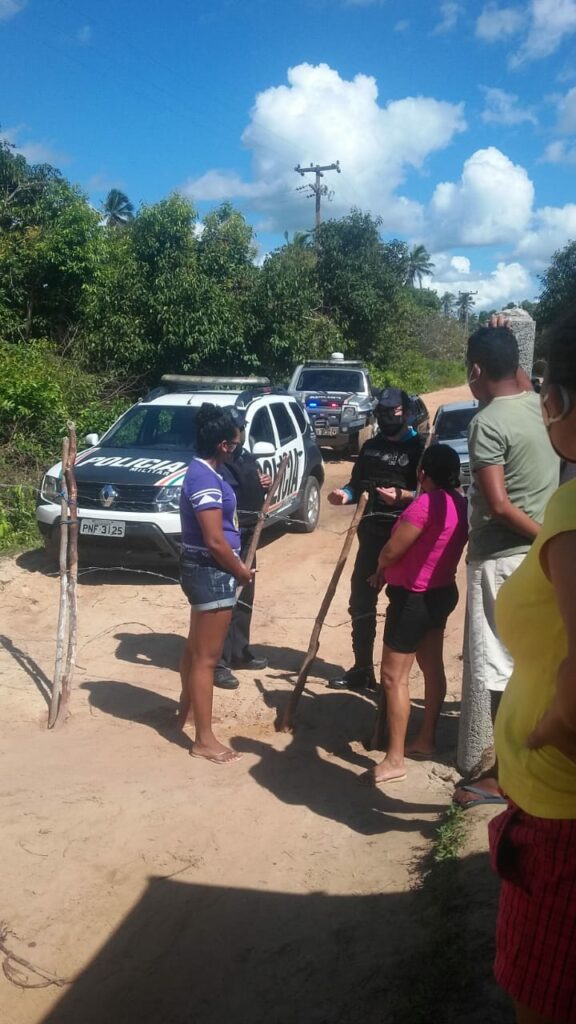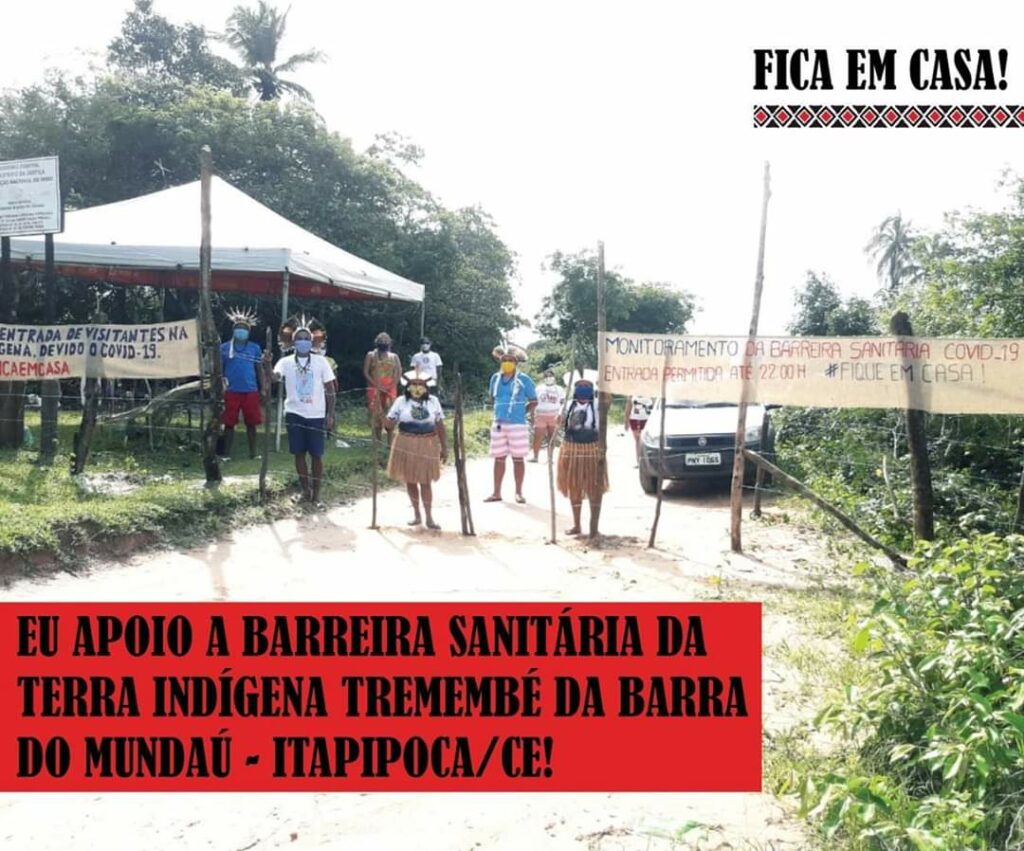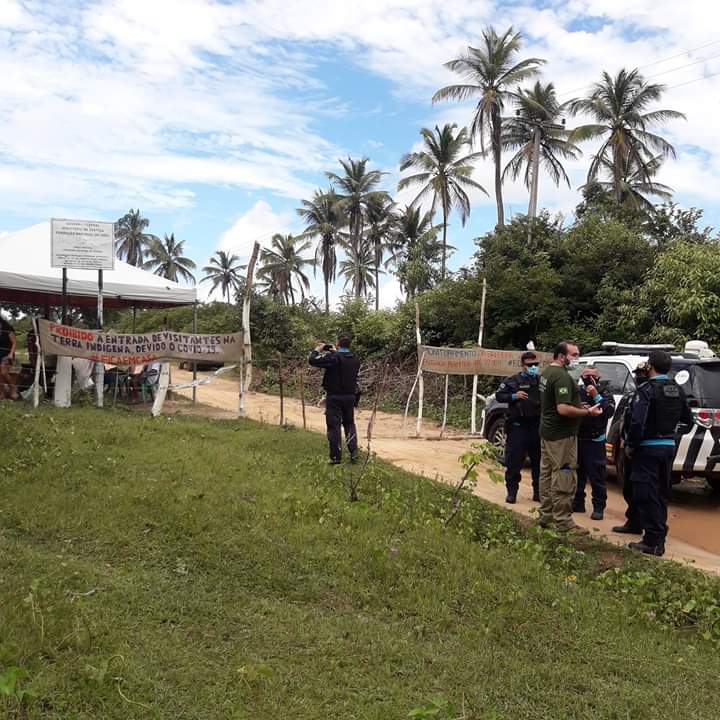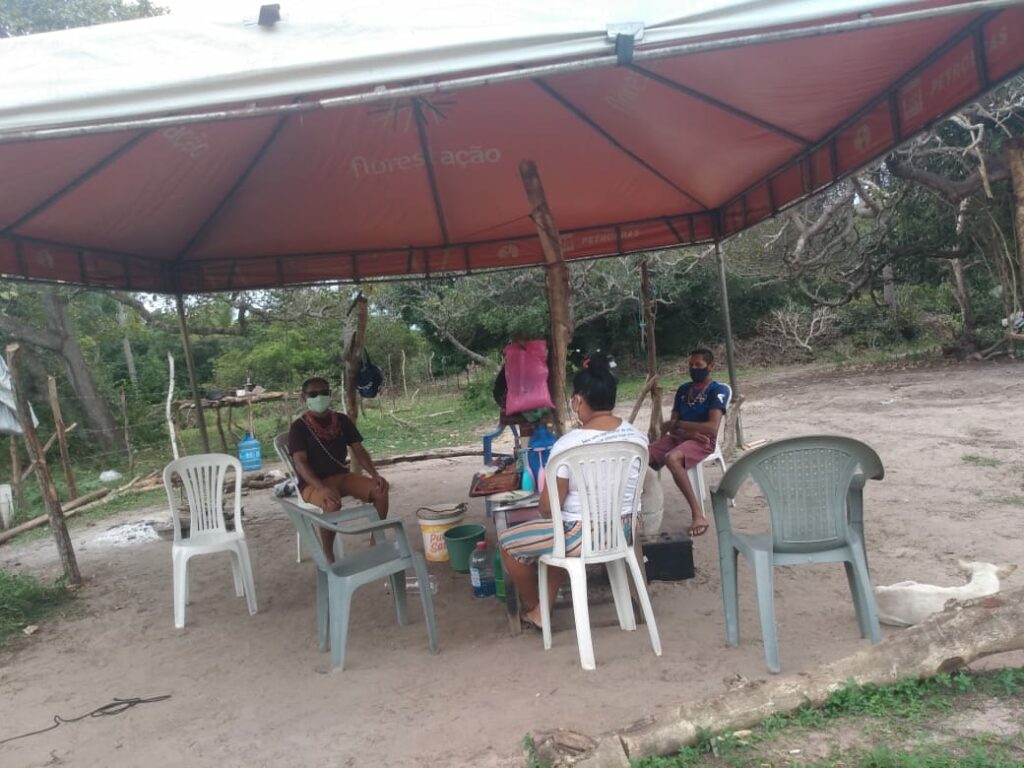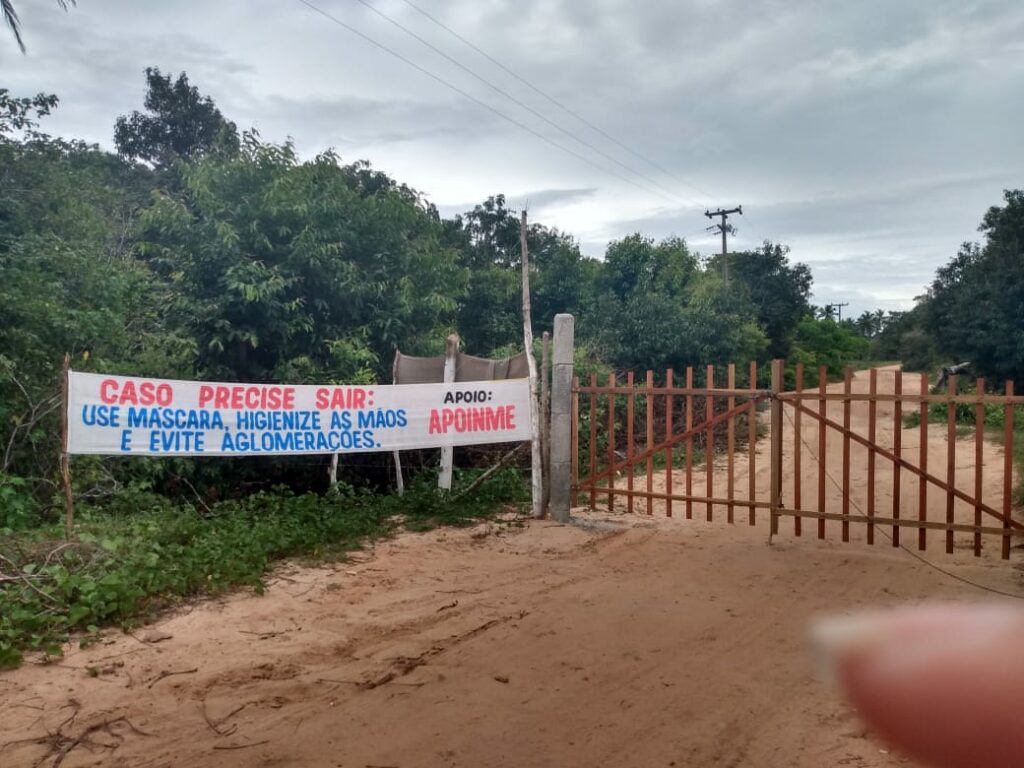Maria de Jesus Sobrinho – Tremembé
My name is Maria de Jesus Sobrinho. I am 56 and am a Tremembé from Almofala, in Itarema [Ceará state]. I would like to talk a little. I am a health agent. I am a midwife. I work in the leadership of my community. So, I wanted to speak for us, from the Indigenous area, about this pandemic, what happened, what is happening. It was very difficult because we are not used to keeping our distance from each another. We are used to being very close, (having) meetings, having conversation circles. It was very difficult for us to act this way, to not do any of this. We are gradually returning, but taking all the precautions. It was difficult, but everyone adapted to the new reality of this period. Thank God, we had few [cases] in the Indigenous area and have a marvelous Indigenous (health) team, in the field, which administers rapid tests, which does exams.
It was not easy for us in terms of survival, because many people still depend a lot on their work, on fishing. Here, many people survive off of fishing and agriculture. It was really bad for those of us in this field. In the field of health, it was bad during these moments of fright, of fear. However, we still have a lot of home remedies to treat ourselves with. In many homes, they managed to recover from a flu, a sore throat, or an earache using our home remedies, our traditional medicine; with tea, with our syrups, which we make ourselves.
In our area, no one needed to be hospitalized for very long. We only needed home cures and some medicine prescribed by the infectious disease specialist. Our infectious disease specialist was taking every precaution from the outset. Even now we are still being very careful, we aren’t receiving many visitors. We aren’t very accustomed to do “lives”, to talking on, to do things using the telephone, but it’s been necessary. We are fully aware of the disease and what our life has become at this time. Our march was cancelled because we couldn’t gather. Many things aren’t happening in our area because of this disease. However, we are managing to overcome, because we’re strong, we’re brave, and we’re managing to move forward. It was very difficult and continues to be very difficult for us, but I believe that we will win…all of us.
Ezequiel Tremembé
Our sanitary barrier was established on 1 May, 2020 and is still in use, at the border of the The Tremembé Indigenous Lands of Barra de Mundaú, in the village of Buriti de Baixo. It was an action conceived by the collective of villages of the Tremembé people, here in Itapipoca, Ceará state, together with the leadership. From there, we began to organize and seek partnerships, mainly for a tent for shelter, and to address the question of gel alcohol, of masks and raising family awareness using pamphlets and banners.
Then, we also offered to provide this support, not just in conjunction with the Indigenous health team, but to seek partnerships as well, with the National Indian Foundation (FUNAI) and the Itapipoca Military Police; so that they could also conduct inspections, and offer guidance, monitoring, and incentives, in the fight against Covid-19 inside the villages. There are four villages, so an operation was needed so that we could keep ourselves safe, without crowds, without loud music and parties, and avoid home visits. This allowed us to protect ourselves.
Even with these measures, we still had 13 Covid-19 cases. Thank God, there wasn’t a major impact, of someone dying, but it also showed that, without this barrier, we could have had a death in our village and the number of cases could have been higher. So, it has been strengthening and protecting us. We are still in this process of prevention, caution, and motivation, with many changes, but we are also focusing on groups, on women, on men; maintaining the daily shifts, day and night, of precautions and also guidelines for those who enter and who leave the village. There is the question of strengthening and organizing the Tremembé, because, in fact, a sanitary barrier requires a very strong and very strategic plan.
In addition to the barrier, we had the support, along with the Brasil da Terra Indigenous School, support from The Center for Labor Studies and Worker Assistance [Cetra]. We received some basic food packages, from a donation campaign for some more needy families. We managed to undertake some projects, for example, with the Fundo Casa [Home Fund] which has been working with nutritional culture in the village, in the field of artisanal fishing and agriculture. I believe this general strengthening of the village will be very important. This situation that we are going through, conducting the fight and prevention of Covid-19, is empowering.
Getúlio Tremembé
I am Getúlio, known as Getúlio Tremembé. I am 37 and am Tremembé. I live in the municipality of Itarema, in Ceará state. Among my people, yes, we have had cases of Covid-19. It was very difficult for us to live with the disease, because it was something unknown to anyone. There were a number of safety protocols to prevent us from contracting the virus, for example, the use of masks. Some villages from the Almofala village group [in the Tremembé de Almofala Indigenous Land] established sanitary barriers so that outsiders couldn’t enter and people only left with complete security. There was constant use of gel alcohol by everyone. Mainly, we followed social isolation precautions, we really isolated ourselves.
For me, being Indigenous, living through this moment was really difficult, something really tricky; because it’s all new, completely new, and there was the fear that at any moment we could catch the disease, especially people who are in at risk groups. So it was precisely that: the fear of contracting [it], and infecting someone, or of someone infecting a relative, including sons…my children. So, there was a great deal of fear. It was a very difficult thing.
There were numerous impacts. One of the main impacts was a question of psychology. This really upset the whole psychology of our people. Something which has been very powerful for us, is that epidemics, these infections, these unknown viruses, historically, were factors that decimated many Indigenous peoples, so that they even ceased to exist. Our greatest fear was precisely this: that the virus would affect us, that many of our people would be affected, and we would get to the point that we couldn’t control it. So, we passed through difficult moments.
Including, in the other Indigenous land, in Córrego do João Pereira (the Córrego do João Pereira Indigenous Land), there was even a case of suicide. The fear, the uncertainty… There was a person who actually killed themselves. So, there were many impacts. Another thing is the question of doing things collectively. When we found ourselves alone, it caused great anguish because we couldn’t do things as a collective, because we couldn’t practice our culture, mainly because we couldn’t practice torém in school, which is something very powerful for us. We can’t go to places that we like a lot, like the beach…Another thing that we really miss is school. We really missed it. Children studying, playing together, adolescents felt many effects.
I didn’t lose a relative (to Covid-19). I knew people who died, who I was close to, including neighbors, people who lost their life; and other people I knew well, who lost people, who were very seriously affected by this virus. So, it’s a warning for everyone, that the virus continues to circulate. But, unfortunately, people relaxed, they don’t want to use masks anymore, thinking that everything’s okay, except that we run the risk of having a second wave of this coronavirus. Continue taking care of yourselves so that you aren’t affected like we were this first time.
